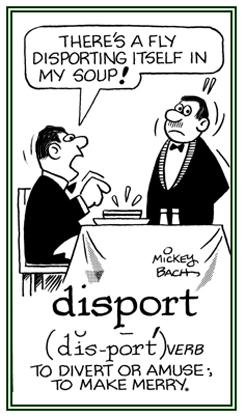dis-, di-, dif-
(Latin: separation, apart, asunder; removal, away, from; negation, deprivation, undoing, reversal, utterly, completely; in different directions)
The meaning of dis- varies with different words; dif-, assimilated form of dis- before f; di-, form of dis- before b, d, g, l, m, n, r, and v.
displease (verb), displeases; displeased; displeasing
displeasingly (adverb)
displeasingness (s) (noun)
displeasurable (adjective), more displeasurable, most displeasurable
Prone to being offensive: The last few months Jane spent with her husband, whom she shortly thereafter divorced, produced many displeasurable and disagreeable memories.
displode, disploding, disploded
1. To drive out or discharge with explosive violence.
2. To burst with a noise; to explode.
2. To burst with a noise; to explode.
displosion
Explosive discharge.
disport (dih SPORT) (verb), disports; disported; disporting
1. To enjoy oneself playfully or to indulge in pleasurable activities: There are many busy people who disport themselves on golf courses.
2. To play in a carefree fashion or to amuse oneself in a lighthearted manner: Little Jimmy was disporting with the other children in his class on the school grounds.
3. Etymology: from Anglo-French disporter, "to divert, to amuse"; from Old French desporter, "to seek amusement"; literally, "to carry away" (from serious matters); from des-, "away" + porter, "to carry"; from Latin portare, "to carry".

© ALL rights are reserved.
Go to this Word A Day Revisited Index
2. To play in a carefree fashion or to amuse oneself in a lighthearted manner: Little Jimmy was disporting with the other children in his class on the school grounds.
3. Etymology: from Anglo-French disporter, "to divert, to amuse"; from Old French desporter, "to seek amusement"; literally, "to carry away" (from serious matters); from des-, "away" + porter, "to carry"; from Latin portare, "to carry".

Go to this Word A Day Revisited Index
so you can see more of Mickey Bach's cartoons.
disportive (adjective), more disportive, most disportive
Pertaining to the amusement or fun that people have together: While waiting for a flight in the airport, Ted's two boys were playing disportive games.
When on vacation, Mark and Maxine were at a resort where they could take part in a variety of disportive activities out on the beach.
disportively (adverb), more disportively, most disportively
Done in an amusing, relaxing, or agreeable manner: The children were disportively playing in the backyard and having a wonderful time!
dispose (verb), disposes; disposed; disposing
1. To place or to set in a particular order; to arrange: Larry and Randy, the waiters at the restaurant, will dispose all of the eating utensils (knives, forks, spoons, etc.) on the tables for breakfast after closing for the evening.
2. To put (business affairs, for example) into correct, definitive, or a conclusive form: James disposed his assets and property in a conscientious manner.
3. To put into a willing or receptive frame of mind: Irene's teacher is well disposed to think highly of the music of J. S. Bach.
4. To transfer or part with, as by giving or selling something: Gary decided to dispose of his antique car when he retired.
5. To get rid of; to throw out: Some people dispose of the most astonishing household objects; such as, good mirrors, furniture, etc.
2. To put (business affairs, for example) into correct, definitive, or a conclusive form: James disposed his assets and property in a conscientious manner.
3. To put into a willing or receptive frame of mind: Irene's teacher is well disposed to think highly of the music of J. S. Bach.
4. To transfer or part with, as by giving or selling something: Gary decided to dispose of his antique car when he retired.
5. To get rid of; to throw out: Some people dispose of the most astonishing household objects; such as, good mirrors, furniture, etc.
1. A natural or acquired habit or characteristic tendency in a person or thing; temperament: Almut's natural disposition is to always try to be cheerful and content.
2. An act of getting rid of something or giving it to another person: The disposition of Uncle Jim's property was easily accomplished.
2. An act of getting rid of something or giving it to another person: The disposition of Uncle Jim's property was easily accomplished.
The safe disposition of toxic refuse is highly contested in some neighborhoods.
3. An attitude of mind especially one that favors one alternative over others: Mayor Nelson's disposition on the topic of waste management was to expand the land fill sites.Some animals and humans have sweet or sour dispositions, or personalities; and some of them also share the disposition to eat greedily, to yawn loudly, or to run around making odd noises.
4. A final settlement: The court made a final disposition of the deceased's property to specific relatives.
dispossess (verb), dispossesses; dispossessed; dispossessing
To force a person, or people, to give up the ownership of a house, land, or other property: The new dictator of the country dispossessed many people of their land and homes.
1. The expulsion of someone; such as, a tenant from the ownership of land or other property by the process of law: There was a dispossession of Jason's next door neighbors because the couple failed to pay their taxes over a period of five years.
2. Etymology: from Old French despossesser, "to dispossess", from des-, "dis-, lack of, not" + possesser, "possess" which stands forpots-sidere, literally "to sit as a master".
2. Etymology: from Old French despossesser, "to dispossess", from des-, "dis-, lack of, not" + possesser, "possess" which stands forpots-sidere, literally "to sit as a master".
The first element is a contraction of potis, "able, mighty, powerful"; while the second element is related to sedere, "to sit" and "to sit down".
dispraise


